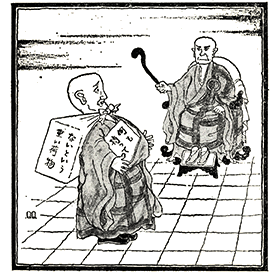Use of Cookies
Our website uses cookies to facilitate and improve your online experience.
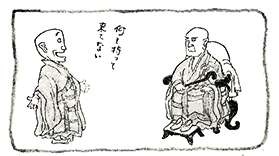
If someone says something which does not make sense, people say, “It sounds like a Zen debate (Zen mondo)”. And it is true that there is such an aspect in Zen debates. For example, one monk who was undergoing training asked Yunmen (Unmon, in Japanese, a Tang Dynasty monk who founded the Unmon School of Zen), “What is Buddha?
Yunmen answered “A piece of used toilet paper.”
Now “Buddha” is what monks in training pray to constantly and is the goal which they ceaselessly try to attain. Consequently, “What is Buddha?” is frequently asked in debates. To this question, the teachers from ancient times on down have given many different answers to guide the student monks.
However, Yunmen’s answer was extreme. “Kanshi ketsu” means “wiping stick” and is a very filthy thing. In fact, one may become angry and say, “What does he think the Buddha is?”, but this is the superficial view. The true meaning of these debates is very profound, even though the words themselves seem to be nonsense.
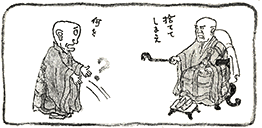
In the ninth century, during the Tang Dynasty, there was an excellent Zen master named Zhaozhou (Joshu, in Japanese). One day a monk named Yanyang (Gon’yo, in Japanese) asked him, “I have come with nothing. What do I do in such a case?”
Zhaozhou replied, “Throw it away.” On the surface, this was not an answer. Then Yanyang asked as though cross examining, “I said I came with nothing, so what do you expect me to throw away?”
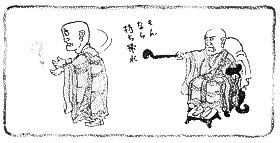
Zhaozhou promptly said, “Then hurry and take it away.” This was even a stranger answer than the previous one. Zen debates are strange, and a certain storyteller made a comedy out of one:
One day a monk on pilgrimage came to the front of a mountain temple and shouted, “Hello! Is the head priest here? I want to have a debate with him.” A novice priest came out of the temple and shouted back even louder, “First let’s you and I have a debate, and if you beat me then I’ll call the head priest.”
“Why you impudent little … all right,” and the traveling monk silently extended his right hand and made a circle with his thumb and index finger.
The boy immediately made a larger circle with his arms.
The traveling monk held up one finger.
The boy responded by raising five fingers.
The pilgrim monk then raised three fingers which the boy countered by making a face. As though beaten, the pilgrim hurriedly ran away.
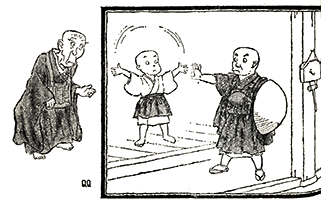
The head priest had witnessed this question and answer session through a crack in the door, and he was surprised. He was surprised because he interpreted the dialogue as follows. The circle made by the traveling monk meant “What is your mind?”
In response to this the boy had made a large circle which meant “Like an ocean”, and this was a splendid answer. The one finger raised by the pilgrim meant “How about your body?” In reply the novice priest had raised five fingers, which signified the five Buddhist precepts ― no killing, no stealing, no adultery, no lying and no drinking. This again was a suitable answer. The pilgrim’s raising of three fingers represented the three great worlds which make up the entire universe, and the boy’s making a face meant “It is in front of my eyes.”
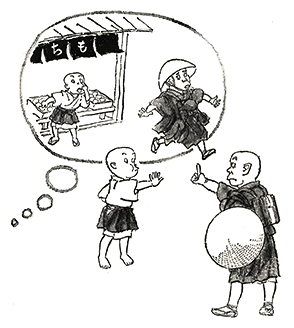
The head priest who had interpreted the debate in this way thought, “How strange. The boy can’t have that much ability, can he?” Calling out to the acolyte he asked, “What were you doing there?”
“The traveling monk must have heard that I was the son of a mochi (rice cake) dealer.”
“Why?”
“Because he made a small circle to say that my father’s rice cakes are small. That’s why I made a larger circle to show that they’re big. Then he asked how much one costs, and I told him five pennies. And he wanted me to discount the price to three pennies, so I made a face. He must not have had any money because he ran away.”
The head priest burst out laughing. This dialogue is opposite that of the one before. Even though the form is the same, the content is incoherent.
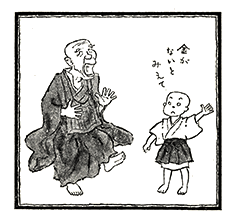
Now, returning to the original story ― Yanyang said, “I have nothing.” In other words, “I have attained ‘satori’ (enlightenment) egolessness, and ‘no mind’.” However, from Zhaozhou’s point of view, Yanyang had too much. ‘If you have one thing on your mind, you have a heavy load on your back.’ And Yanyang was carrying around a heavy load which he called “having nothing”.
When one is really healthy he forgets his good health. A drinker may say, “I’ve had enough, I’ve had enough,” but as long as he keeps the glass in his hand he hasn’t had enough. If he really had enough, he would put the glass down.
That is why Zhaozhou said, “Throw it away,” and urged Yanyang to take one more step off the top of the hundred foot bamboo pole to truly attain enlightenment, but Yanyang did not understand this. He retorted, “I said I had nothing, so how can I throw anything away?” Here, finally, his pride in not ‘having anything’ came out. And this is why Zhaozhou said, “Then, take it with you.”
